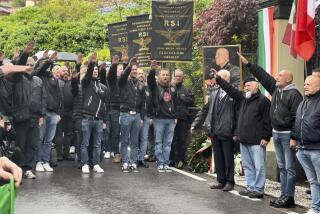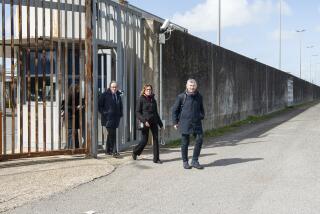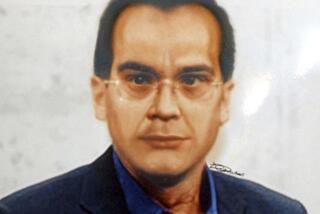Ex-Nazi Major’s Release Protested : Italy Frees War Criminal Accused of Killing 1,830
- Share via
ROME — A former Nazi SS major serving a reduced life sentence in a remote Norman fortress south of Rome was freed Thursday and flown to Austria over the protests of villagers who said that he killed 1,830 of their relatives and fellow citizens in World War II. He was the last major war criminal imprisoned in Italy.
Former SS Maj. Walter Reder, 69 and ailing with what his priest called “not just one sickness but several,” was released without formal advance announcement, flown directly to his native Austria and taken to a military hospital at his request.
Political sources in Rome said the release was approved by the government of Prime Minister Bettino Craxi as a gesture of conciliation to the Austrians, with whom Italy has had longstanding territorial differences over the ethnically Austrian South Tyrol. Austria had repeatedly sought Reder’s release on grounds of illness.
In Vienna, Austrian Defense Minister Friedhelm Frischenschlager described Reder’s release as a “humanitarian matter.”
But in the village of Marzabotto, south of Bologna, where Reder’s 16th Battalion of the SS (elite guard) 16th Panzer Division was accused of a 1944 massacre, there were immediate protests.
“The sorrow caused to the relatives of the victims has been ignored,” complained Socialist Deputy Mayor Romano Stefanelli, who said that 14 members of his family died in the wartime reprisal killings. “The people here can never pardon him because they would have to do so in the name of the dead.”
Dante Cruicci, the Communist mayor who has twice conducted village referendums that overwhelmingly rejected the idea of clemency for Reder, said, “What saddens us is that the decision to free him was made without taking into account the victims and families of the victims.”
Reder was sentenced to life imprisonment by an Italian military court in 1951 for murders of civilian men, women and children, including infants, in raids on several villages in the area south of Bologna. The raids were in reprisal for partisan attacks against German military units.
Although records show that there were several thousand victims of the reprisals in the area, and 1,830 in Marzabotto alone, Reder recently complained in a letter to the Italian news agency ANSA that he was “fed up with reading” what he called a “gross historic and juridical lie.” He complained that the military court convicted him in the deaths of only 270 civilians in the autumn of 1944.
Like Rudolph Hess, still serving as the lone prisoner in the Spandau fortress of Berlin, Reder was confined as the sole prisoner of the Norman fortress of Gaeta, an ancient military facility between Rome and Naples.
“I am the prince of the castle,” he liked to joke, according to Father Germano Greganti, head of a Roman Catholic prisoner assistance group that had sought Reder’s release on grounds of compassion and health.
“He has not just one sickness but several, apart from the loss of his left arm during the war,” Greganti said. “He is semi-paralyzed in his right arm, he has had three stomach operations for suspected cancer, he has been operated on the colon for the same reason and he has arteriosclerosis in the brain.”
Greganti said that Reder converted to Catholicism about 15 years ago “and is truly penitent for what he has done, which was an act of war, not the wholesale massacre people continue to describe in the press.”
In 1980, an Italian military tribunal decided under the terms of the Geneva Conventions and Italy’s treaties with Austria concerning prisoners to reduce Reder’s life sentence, providing for his release in July of this year, but the Craxi government acted early at Austrian request.
Hinting five days ago that the release was forthcoming, Craxi told a news conference that Italy did not need “an old man locked up in a castle to keep alive the memory of the massacre.”
But in Marzabotto, where just last December citizens voted 237 to 1 against the early release of Reder, feelings were not so benign. Mayor Cruicci explained why:
“During the advance of the Allies in 1944, there was a halt to their progress around September and October, and in that time Reder had orders to clear the road for the retreating German armies because the partisans were on the high ground waiting to meet the Allies in the area of Marzabotto. Reder’s battalion did this by killing priests in church, killing babies, knifing pregnant mothers.”
“Reder could have rounded up the populations of these small villages and farming areas,” Deputy Mayor Stefanelli said, “but instead he just killed them all indiscriminately.”
More to Read
Sign up for Essential California
The most important California stories and recommendations in your inbox every morning.
You may occasionally receive promotional content from the Los Angeles Times.










